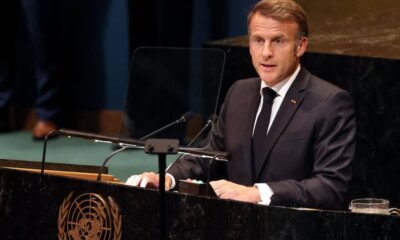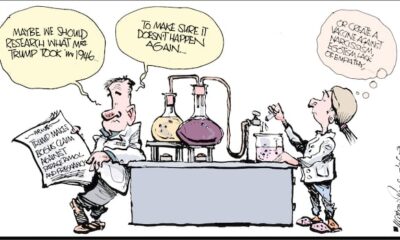Health
WHO statement on autism-related issues
Read more on post.
The World Health Organization (WHO) emphasizes that there is currently no conclusive scientific evidence confirming a possible link between autism and use of acetaminophen (also known as paracetamol) during pregnancy.
Globally, nearly 62 million people (1 in 127) have autism spectrum disorder, a diverse group of conditions related to development of the brain. Although awareness and diagnosis have improved in recent years, the exact causes of autism have not been established, and it is understood there are multiple factors that can be involved.
Extensive research has been undertaken over the past decade, including large-scale studies, looking into links between acetaminophen use during pregnancy and autism. At this time, no consistent association has been established.
WHO recommends that all women continue to follow advice of their doctors or health workers, who can help assess individual circumstances and recommend necessary medicines. Any medicine should be used with caution during pregnancy, especially in the first three months, and in line with advice from health professionals.
Also, a robust, extensive evidence base exists showing childhood vaccines do not cause autism. Large, high-quality studies from many countries have all reached the same conclusion. Original studies suggesting a link were flawed and have been discredited. Since 1999, independent experts advising WHO have repeatedly confirmed that vaccines—including those with thiomersal or aluminum—do not cause autism or other developmental disorders.
Childhood vaccine schedules are developed through a careful, extensive and evidence-based process involving global experts and country input. The childhood immunization schedule, carefully guided by WHO, has been adopted by all countries, and has saved at least 154 million lives over the past 50 years. The schedule remains essential for the health and wellbeing of every child and every community. These schedules have continually evolved with science and now safeguard children, adolescents and adults against 30 infectious diseases.
Every vaccine recommendation by the Strategic Advisory Group of Experts on Immunization (SAGE), an independent advisory group to WHO, is grounded in rigorous review of evidence and carefully designed to offer the best protection against serious diseases and to be delivered when most needed.
When immunization schedules are delayed or disrupted, or altered without evidence review, there is a sharp increase in the risk of infection not only for the child, but also for the wider community. Infants too young to be vaccinated and people with weakened immune systems or underlying health conditions are at greatest risk.
Autism and neurodevelopmental disorders are among priority mental health and neurological conditions being discussed at the 4th UN High-Level Meeting on NCDs and mental health this Thursday, 25 September. As a global community, we need to do more to understand the causes of autism and how best to care for and support the needs of autistic people and their families.
WHO is committed to advancing this goal working together with partners including autistic-led organizations and other organizations representing persons with lived experience. WHO also stands with people who are living with autism and their families, a dignified community entitled to evidence-based considerations free of stigma.
Health
Minister visits HSE’s Social Inclusion services in Waterford
Read more on post.
HSE Dublin and South East Media Release
24 September, 2025
The HSE’s Primary Care/Social Inclusion services in Waterford were delighted to host the Minister of State at the Department of Health with special responsibility for Public Health, Wellbeing and the National Drugs Strategy Jennifer Murnane O’ Connor T.D. on a visit to their offices at St. Otteran’s Hospital.
An overview was provided for the Minister on the services available in such spheres as Addiction (including HSE community agencies supported by the HSE under Section 39 of the Health Act), Homeless services, Traveller Health, Migrant Health, Family Support and work with the Roma community.
Having been welcomed by Lisa Robson (General Manager/Social Inclusion) of the Primary Care Services for the Waterford/Wexford and Carlow-Kilkenny/Tipperary South Integrated Healthcare Areas of the HSE’s Dublin and South East region, Minister Murnane O’ Connor heard from various team members as to the supports it provides locally.
In partnership with other agencies the HSE’s Primary Care/Social Inclusion service supports the development and implementation of initiatives that enhance health care delivery to improve access and ensure equitable health outcomes for vulnerable groups. This is towards ensuring that health outcomes for socially excluded groups in society are improved.
In terms of working for equitable health outcomes for vulnerable groups, the HSE’s Social Inclusion services are working with Refugees, Asylum Seekers who are now recognised as People Seeking International Protection, Beneficiaries of Temporary Protection, Roma, Travellers and LGBT+ people and their families, those with Addictions and those who experience or who are at risk of Homelessness.
HSE Social inclusion works in partnership with the community and voluntary sectors and across a range of statutory services, to improve access to health services for disadvantaged groups. This includes provision of targeted interventions for people from marginalised groups who experience health inequalities, have difficulties accessing services and present with multiple, complex health and support needs (including health supports for people who are homeless and in relation to domestic, sexual and gender-based violence).
The HSE’s Substance Misuse services comprise of range of free and confidential services in Waterford City and County. This service is for anyone affected by problematic drugs or alcohol misuse and can be accessed by individuals regardless of what stage they are at, across the spectrum of addiction. The Substance Misuse recovery team in Waterford comprises of: GPs, an Assistant Director of Nursing, Substance Misuse Liaison Nurses, a Drug and an Alcohol Liaison Midwife, a Senior Counsellor, Addiction Counsellors, Community based Drug and Alcohol workers, Outreach Workers, Drugs Education Officer, local Substance Misuse Co-ordinators and a Clinical Lead. The team also work with the HSE’s Primary Care services, GPs and community pharmacies in providing a patient centred approach.
Last updated on: 24 / 09 / 2025
Health
Minister visits HSE’s Health and Wellbeing Hub in Waterford
Read more on post.
The Minister of State at the Department of Health with special responsibility for Public Health, Wellbeing and the National Drugs Strategy Jennifer Murnane O’ Connor T.D. was in Waterford to visit the HSE’s Health and Wellbeing Hub, located in the former St. Martin’s School, Kilcohan.
It was an opportunity for the Minister to meet and greet community delivery partners and health and wellbeing teams who provide integrated service delivery, supporting the vision of the Sláintecare strategy.
Among the groups with whom Minister Murnane O’ Connor chatted during her visit were:
- The Waterford Sláintecare Healthy Communities programme, including representatives of the HSE, Waterford City and County Council and community partners.
- The HSE’s Health Promotion and Improvement Team and workers in the Healthy Childhood Programme (Breastfeeding Initiatives in Waterford).
- The Waterford Vaccination Centre Team (who administer the RSV, Flu and COVID-19 booster vaccines at their Centre in Kilcohan).
- The HSE’s national Healthy Living and Active Living (HEAL) team and the HSE’s National Alcohol programme team, members of each being based in the Kilcohan centre.
The Health and Wellbeing Hub in Kilcohan is a regional demonstration site for integrated prevention and early intervention and delivers practical, community-based supports aligned to Sláintecare.
Welcoming Minister Murnane O’ Connor to the Hub, Kate Cassidy (General Manager, Health and Wellbeing, HSE) said:
“We were pleased that we got to update the Minister on our current activity, which includes the Healthy Food Made Easy (HFME) initiative, our smoking cessation service (including the Quit and Stay Quit during Pregnancy programme), breastfeeding-friendly initiatives and peer support, chronic disease prevention and self-management supports and alcohol harm-reduction.”
“Through close collaboration with community partners (the local authority, Family Resource Centres, Traveller Health Project, the local Sports Partnership and SETU), the Hub reduces barriers to access, addresses local health inequalities and maximises shared facilities, workforce and data-informed planning. It also supports the ongoing transition to regional health areas such as the HSE Dublin and South East health region structure, by modelling joined-up governance, shared infrastructure and co-ordinated pathways across community and clinical services.”
“Another important feature of the HSE’s work at Kilcohan that the Minister was able to see fist-hand was the integrated vaccination service – regarding Flu, COVID-19, Respiratory Syncytial Virus (RSV), school based Live Attenuated Influenza Vaccine (LAIV – nasal application for those aged 2-17 years) outreach to long term care facilities and those housebound.”
Last updated on: 24 / 09 / 2025
Health
Uncontrolled high blood pressure puts over a billion people at risk
Read more on post.
The World Health Organization (WHO) today released its second Global hypertension report, showing that 1.4 billion people lived with hypertension in 2024, yet just over one in five have it under control either through medication or addressing modifiable health risks.
The new report–released at an event co-hosted by WHO, Bloomberg Philanthropies, and Resolve to Save Lives during the 80th United Nations General Assembly–also reveals that only 28% of low-income countries report that all WHO-recommended hypertension medicines are generally available in pharmacies or primary care facilities.
Hypertension is a leading cause of heart attack, stroke, chronic kidney disease, and dementia. It is both preventable and treatable – but without urgent action, millions of people will continue to die prematurely, and countries will face mounting economic losses. From 2011 to 2025, cardiovascular diseases–including hypertension–are projected to cost low- and middle-income countries approximately US$ 3.7 trillion, equivalent to around 2% of their combined GDP.
“Every hour, over 1000 lives are lost to strokes and heart attacks from high blood pressure, and most of these deaths are preventable,” said Dr. Tedros Adhanom Ghebreyesus, WHO Director-General. “Countries have the tools to change this narrative. With political will, ongoing investment, and reforms to embed hypertension control in health services, we can save millions and ensure universal health coverage for all.”
“Uncontrolled high blood pressure claims more than 10 million lives every year, despite being both preventable and treatable. Countries that integrate hypertension care into universal health coverage and primary care are making real progress, but too many low- and middle-income countries are still left behind,” said Dr Kelly Henning, who leads the Bloomberg Philanthropies Public Health Program. “Strong policies that raise awareness and expand access to treatment are critical to reducing cardiovascular disease and preventable deaths.”
Persistent barriers
Analysis of data from 195 countries and territories shows that 99 of them have national hypertension control rates below 20%. The majority of the affected people live in low- and middle-income countries, where health systems face resource constraints.
The report highlights major gaps in hypertension prevention, diagnosis, treatment, and long-term care. Key barriers include weak health promotion policies (on risk factors such as alcohol, tobacco use, physical inactivity, salt, and trans fats), limited access to validated blood pressure devices, lack of standardized treatment protocols and trained primary care teams, unreliable supply chains and costly medicines, inadequate financial protection for patients, and insufficient information systems to monitor trends.
Access to medicines: a cornerstone of progress
Blood pressure medication is one of the most cost-effective public health tools. Yet only 7 out of 25 (28%) of low-income countries report general availability of all WHO-recommended medicines, compared to 93% of high-income countries. The report explores the barriers and strategies for improving access to hypertension medication through better regulatory systems, pricing and reimbursement, procurement and supply chain management, and improved prescribing and dispensing of these medicines.
“Safe, effective, low-cost medicines to control blood pressure exist, but far too many people can’t get them,” said Dr Tom Frieden, President & CEO, Resolve to Save Lives. “Closing that gap will save lives — and save billions of dollars every year.”
Country-level progress
Despite barriers, progress is possible. Bangladesh, the Philippines, and South Korea have made significant progress by integrating hypertension care into universal health coverage (UHC), investing in primary care, and engaging communities:
- Bangladesh increased hypertension control from 15% to 56% in some regions between 2019-2025 through embedding hypertension treatment services in its essential health service package and strengthening screening and follow-up care.
- The Philippines has effectively incorporated the WHO’s HEARTS technical package into community-level services nationwide.
- South Korea has integrated health reforms, including low costs for antihypertensive medications and limiting patient fees, which have resulted in the high rate of blood pressure control nationally: 59% in 2022.
WHO calls on all countries to embed hypertension control in UHC reforms. Implementing the measures recommended in the report could prevent millions of premature deaths and ease the massive social and economic toll of uncontrolled high blood pressure.
Editor’s note:
WHO defines clinical hypertension in adults as systolic blood pressure ≥140 mmHg and/or diastolic blood pressure ≥90 mmHg on two different days. By contrast, high blood pressure can increase the risk of heart and kidney disease even at levels below this threshold. For example, systolic blood pressure under 130 mmHg—though not classified as hypertension—still raises health risks.
About the World Health Organization
Dedicated to the well-being of all people and guided by science, the World Health Organization leads and champions global efforts to give everyone, everywhere an equal chance at a safe and healthy life. We are the UN agency for health that connects nations, partners and people on the front lines in 150+ locations – leading the world’s response to health emergencies, preventing disease, addressing the root causes of health issues and expanding access to medicines and health care. Our mission is to promote health, keep the world safe and serve the vulnerable. For more information, visit www.who.int and follow WHO on Twitter, Facebook, Instagram, LinkedIn, TikTok, Pinterest, YouTube.
About Bloomberg Philanthropies
Bloomberg Philanthropies invests in 700 cities and 150 countries around the world to ensure better, longer lives for the greatest number of people. The organization focuses on creating lasting change in five key areas: the Arts, Education, Environment, Government Innovation, and Public Health. Bloomberg Philanthropies encompasses all of Michael R. Bloomberg’s giving, including his foundation, corporate, and personal philanthropy as well as Bloomberg Associates, a philanthropic consultancy that advises cities around the world. In 2024, Bloomberg Philanthropies distributed $3.7 billion. For more information, please visit bloomberg.org, sign up for our newsletter, or follow us on Instagram, LinkedIn, YouTube, Threads, Facebook, and X.
The global hypertension report is funded by Bloomberg Philanthropies.
About Resolve to Save Lives
Resolve to Save Lives is a global health organization that partners locally and globally to create and scale solutions to the world’s deadliest health threats. Since 2017, we’ve worked with governments and other partners in more than 60 countries to save millions of lives. To find out more, visit resolvetosavelives.org or LinkedIn.
-
Breaking News1 day ago
Barack Obama to be conferred with freedom of Dublin at ceremony on Thursday
-
Breaking News1 day ago
Opinion: To be or not to be? Why it is time to drop Shakespeare’s compulsory status in Leaving Cert
-
Culture1 day ago
Taylor Swift’s new cinema outing generates more than €12million in just 24 hours
-
Breaking News1 day ago
Minister rejects proposal to make Shakespeare optional in Leaving Cert English
-
Breaking News1 day ago
Families at risk of homelessness may have another chance to avail of tenant-in-situ scheme
-
Politics1 day ago
European Parliament snubs Orbán with vote to shield Italian MEP from Hungarian arrest
-
Culture1 day ago
Milan Fashion Week 2025: Unmissable shows and Giorgio Armani in mind
-
Travel & Lifestyle2 days ago
The Best Way to See Rome? On a Running Tour at Sunrise













































